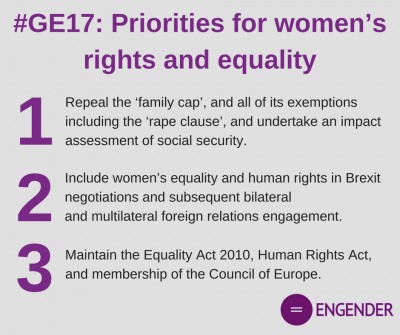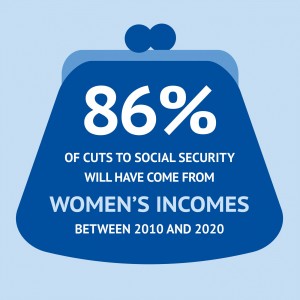Engender blog
UK General Election 2017: Priorities for women’s rights and equality

On June 8th 2017 the UK will go to the polls for a snap General Election (the BBC have a handy 'what you need to know' guide if you're not sure what that means).
Many have been taken by surprise by this election, and while parties are working on selecting their candidates and writing manifesto, we're keen to make sure that calls for women's equality aren't lost in the melee.
The ‘family cap’ and ‘rape clause’: where do we go from here?

Sometimes in the life of a gender advocate the stars align to create a Platonic policy process. A proposal comes forward from government that is simple and easy to understand. Gender-disaggregated data is available. Other women’s organisations have the resource and interest to engage in a discussion about how to respond. Women are easy to include in the conversation. Feminist analysis leads inexorably to specific policy calls. Colleagues from across civil society agree with our take on the government’s proposals, and integrate our asks into their lobbying strategies. Government listens keenly to our input and develops its policy accordingly.
Most of the time, though, there is much more friction in feminist policy and advocacy. Government proposals may be vague or unclear, or broken into chunks that are hard to knit together. Consultation processes may be too short. There may be no data on how the policy will affect women and men, or no data at all. Other women’s organisations may not have the time or resource to focus on a specific area of policy, because of competing priorities. Feminist analysis may produce politically untenable asks. Other women’s organisations may disagree on our analysis or approach, or have other political drivers to sit out a particular issue. Colleagues from across civil society may feel that the gender dimension is a distraction or dilution of their own urgent priorities. Government may intentionally shape a consultation process to distance civil society, and women’s organisations.
The recent lobby and advocacy around the ‘family cap’ and ‘rape clause’ has definitely involved some friction. What that is, and why that has been sheds some light on broader questions about gender and policy.
There are lots of people in Scotland who have only become aware of the ‘rape clause’ in the last few weeks. In fact, its story began almost two years ago. So what’s been going on, and where do we go from here?
Scottish Women’s Aid, Rape Crisis Scotland, and Engender statement on the ‘rape clause’, ‘family cap’ and the UK general election
Our joint UK Parliament petition to scrap the ‘family cap’, including the ‘rape clause’, reached over 20,000 signatures in just its first weekend. This demonstrates the huge strength of feeling on this issue from people across the UK. In Scotland we have seen two large demonstrations, and statements of support from the leaders of four political parties, including First Minister Nicola Sturgeon.
5 things you can do to help call on the UK Government to scrap the 'family cap' and 'rape clause'
This week, we've released a special edition of #FridayFeministFive focusing on our campaign calling on the UK Government to scrap the abhorrent ‘family cap’ and ‘rape clause’. Here we list 5 simple things you can do to help.
Guest post: Explaining Secondary Legislation and the 'rape clause'
Juliet Swann is a policy and parliamentary consultant, Engender board member, and an expert on all things to do with participation in democracy. Here she takes a deep dive into the mechanics of the secondary legislation surrounding the 'family cap' and 'rape clause':
Downloads
 Engender Briefing: Pension Credit Entitlement Changes
From 15 May 2019, new changes will be introduced which will require couples where one partner has reached state pension age and one has not (‘mixed age couples’) to claim universal credit (UC) instead of Pension Credit.
Engender Briefing: Pension Credit Entitlement Changes
From 15 May 2019, new changes will be introduced which will require couples where one partner has reached state pension age and one has not (‘mixed age couples’) to claim universal credit (UC) instead of Pension Credit.
 Engender Parliamentary Briefing: Condemnation of Misogyny, Racism, Harassment and Sexism
Engender welcomes this Scottish Parliament Debate on Condemnation of Misogyny, Racism, Harassment and Sexism and the opportunity to raise awareness of the ways in which women in Scotland’s inequality contributes to gender-based violence.
Engender Parliamentary Briefing: Condemnation of Misogyny, Racism, Harassment and Sexism
Engender welcomes this Scottish Parliament Debate on Condemnation of Misogyny, Racism, Harassment and Sexism and the opportunity to raise awareness of the ways in which women in Scotland’s inequality contributes to gender-based violence.
 Gender Matters in Social Security: Individual Payments of Universal Credit
A paper calling on the Scottish Government to automatically split payments of Universal Credit between couples, once this power is devolved to the Scottish Parliament.
Gender Matters in Social Security: Individual Payments of Universal Credit
A paper calling on the Scottish Government to automatically split payments of Universal Credit between couples, once this power is devolved to the Scottish Parliament.
 Gender Matters Manifesto: Twenty for 2016
This manifesto sets out measures that, with political will, can be taken over the next parliamentary term in pursuit of these goals.
Gender Matters Manifesto: Twenty for 2016
This manifesto sets out measures that, with political will, can be taken over the next parliamentary term in pursuit of these goals.
 Scottish NGO Briefing for UN Special Rapporteur on Violence Against Women
Joint briefing paper for the UN Rapporteur on Violence Against Women.
Scottish NGO Briefing for UN Special Rapporteur on Violence Against Women
Joint briefing paper for the UN Rapporteur on Violence Against Women.

Newsletter
Sign up to receive our newsletter here:
Sign up to our mailing list
Receive key feminist updates direct to your inbox: